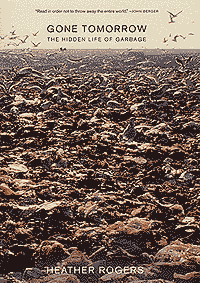 Introduction
Introduction
I often quip with an audience by claiming that Engels and Marx were slightly off target in their analysis of industrial society. Instead of the economy being the foundation upon which political economy is based, I say that they had to look a bit lower to find the "deeper determinants" of political economy, the waste stream. I suggest that the true reflection of social conditions is how a society handles its waste.
Heather Rodgers has tried to make this case for me. She does not entirely succeed. But despite its few shortcomings, she has written a book that is destined to be a classic in the field. It is a worthy addition to Martin Melosi's "Garbage in the Cities", 1981. Students of solid waste management and its role in the US economy will not be able to ignore her information, insight, and exceptional historical research; the book will serve dissertation writers and essayists well into the future.
A 19-minute DVD with additional information complements the book. It is an enticement to explore the fascinating world of garbage for students, professors and activists, informed citizens and entrepreneurs. In fact, the world of garbage is not hidden in US culture and political economy. Rather, it has been an issue of practical and philosophical concern since the industrial era began.
Garbage in the US
The future of garbage is not what it used to be! The era of cheap energy and disposal is over. Garbage generation and management are both changing rapidly in an economy with too little oil and environment with too much carbon dioxide. Heather Rodgers describes thoroughly the new circumstances as they are reflected in the waste stream. Using her engaging, skillful prose, suitable for the professional and the novice alike, she makes garbage her context for examining our lives.
"Rubbish Past" details the birth of industrial garbage: "Commodities that had once been made in small workshops or at home were now produced on a mass scale...By 1869 in New England, soap and candles were to be made in each separate family, now, comparative few take this toil upon them.'"
The post-World War II waste stream experienced a "phantasmagoric rush," a "reverse cornucopia," of new products and packaging. Landfills "metastasized like cancer across the nation." Corporate profit trumped efficiency of production in "the industrially driven transition to disposability."
Industrialized garbage is a dangerous "cocktail" of production, threatening our air, oceans, and forests; it is a "pathology" of the industrial system. Consumption is at the heart of the system. Rodgers correctly relies on Marxism's analysis of consumption and fetishism as a core criticism of industrial production. The captains of US industry also became its captains of consciousness. Unchecked, their system is devouring the globe and threatening survival. Plastic particles now outnumber plankton, the source of life on earth, by a 6-1 margin in every ocean on the earth. Robert Frost, in his poem "Fire and Ice," wondered which of these two elements would eventually kill the earth. There may now be a third choice: Tiny particles of plastic. Gone Tomorrow helps the reader understand what was behind the l960s rebirth of the American environmental spirit by describing the environmental threats present in the 50s and 60s.
Rodgers' prose is buttressed by copious facts, footnotes and references, making the case for a new approach to garbage. Her descriptions of evolving landfill and incinerator technology, and of garbage's political economy, are excellent. Her insights into the recycling movement are well-founded. Recycling activism, while a positive force, has only contained the problem: Increased recovery has been met with even more garbage generation. Garbage imperialism started with organized Jewish and Italian criminals who realized that their control of garbage collection and disposal was a way for them to gain a stranglehold on cities. As the initial mobs declined, legal corporate mobs replaced them, often aided by stricter government environmental regulations that only well-capitalized companies could afford. Thus a local problem became a national problem. Rogers intelligently discusses the false panacea of garbage incineration and the early origins of "green washing" by corporate polluters. She adeptly covers women's leadership role in sanitation reform at the turn of the 20th century, and the subsequent professionalization of the field, which immediately excluded women from participation. Gone Tomorrow ends with an excellent summary of the new recycling movement, which since l995 has moved beyond the waste stream to a full-blown critique of the industrial production system and the demand for Extended Producer Responsibility, Clean Production and Maximum Recovery. Rodgers explains the decline of refillable beverage containers, and calls for a return to this zero-waste approach.
Recycling is the "inspiring side of the quest for recovery," and remains the escape valve for communities that want to avoid national garbage companies' oligopoly on collection and disposal.
A highlight of the book, and one that greatly improves upon Melosi's work, is Rodgers' description of current reform actions. Melosi posed that federal action was the ultimate solution. In fact, the driving force for industrial renewal is grassroots activity among citizens, environmentalists, and small businesses. Rodgers introduces readers to the zero-waste movement, which, as noted, is quickly expanding the terms of debate and field of activity.
Minor Shortcomings
Despite the author's copious notations, surprisingly there is no mention of Peter Anderson, Center for A Competitive Waste Industry, whose ideas on corporate landfill hegemony are closely reflected. Other issues could use further inquiry. Reusable containers, for example, clearly are the only zero-waste approach. Yet, the strategic arguments put forward by the Grass Roots Recycling Network and Container Deposit Institute deserve notice. The zero-waste discussion lacks the appropriate emphasis on the importance of international cooperation among grassroots bottom-up activities and top-down directives. A reference to detailed, practical zero-waste activities would help non-practitioners appreciate the distinctions within the zero-waste movement--for example, Gary Liss' "Sixteen Steps Your City Can Take to Introduce Zero Waste." The author's preoccupation with capitalist systems' environmental degradation ignores the role of the USSR and Communist China. Perhaps these economies are assumed to be state capitalist models, and are included in the critique of capitalist production--if so, this assumption should have been stated. The anti-incineration battle in New York City omits mention of the New Source Performance Standards resulting from a compromise by EPA forced by grass roots activists in Spokane, WA. These new rules became the slender legal threads declaring recycling a Best Available Control Technology, and preventing six consecutive mayors from putting an incinerator in every borough. The analysis of the anti-incineration battle in Los Angeles ignores the $2.5 billion capital cost and financial risk that the business community did not want to take, thus forcing Mayor Bradley to withdraw all incineration plans. The role of environmental graduate students is exaggerated.
The Full Picture of Garbage in the US
Rodgers' book, while thorough, could frustrate readers familiar with Marxism's contribution to modern thinking about garbage. Frederick Engels, the world's first marxist and first industrial ecologist, thought the waste problem through to its conclusion: the by products of one plant become the feed stock for another. This vision is a core concept of sustainable development and clean manufacturing. Engels' strategy was the basis for other components of the modern vision of a "stable state," or sustainable industrial system: decentralization of industry leading to a sustainable balance between city and rural life; and returning organic matter to the land in order to heal the "metabolic rift" between humans and nature that industrial extraction had caused.
Gone Tomorrow would also have benefited from William Leiss, who recently described nature as a storehouse of free goods and a sink for industry's waste (Limits to Satisfaction, l972). Herman Daly's deconstruction of the gross national Product (GNP) and conceptualization of an economy that treats materials from "cradle to cradle," fills a critical role in revealing the concept of waste in our economy and culture (Economic Growth, l995).
Most conspicuously absent from this history is Thorsten Veblen, whose writing, at the turn of the 20th century, formed the backbone of the Progressive Era's repulsion of waste. The most accomplished student of Marxism of his era, Veblen would have offered a non-Marxist, market-based critique of US industrial capitalism to complement Rodgers' attraction to Marxism. From 1903 to 1914, in his "Theory of the Leisure Class," "Theory of the Business Class," and "Instincts of Workmanship," Veblen exposes the evils of waste, conspicuous consumption, and absentee ownership. This homegrown critique by the US's first public intellectual would have improved Gone Tomorrow. The book should refer to the array of critiques of capitalist production: the knowledge and inspiration would benefit those battling for sustainability today.
The DVD
Rodgers extends her book's contribution to garbage history and theory through her DVD of the same name. It is an important addition, summarizing the book's main concerns and warnings. It features commercials and ideological mind tricks perpetrated on the US public. If subliminal ads were made illegal in the l950s, nothing has stopped modern advertisements from molding people's sense of self to be inextricably entwined with the materials they own and desire. These clips are worth the proverbial price of admission. They are the very mechanisms that have formed the public mind, and embedded in it the concept of economic and social progress through consumption. The result: Americans generate 7 pounds of garbage per day; Europeans generate less than 2.
The DVD is a worthy complement to the book, but could have benefited from less repetitive "talking head" shots. Only one practitioner is featured--Mary Lou Vanderventer, of Urban, Ore., who is at her best when relating ideas to everyday activities. It would have been useful to hear from garbage and recycling workers, who know much the same as the professors, but from a different perspective.
Conclusion
Garbage reflects one destructive facet of capitalism. It must be addressed in the near term to resolve environmental, economic, and social crises threatening stable industrial growth. The question of sustainability is whether we can solve this problem and enjoy an ample life for all that modern industrial production can provide. If we succeed, we will establish an era of industrial efficiency and environmental responsibility.
– Review: Neil Seldman
President
Institute for Local Self-Reliance
927 15th Street, 4th Floor
Washington, DC 20005
202 898 1610 X 210
First run at ILSR



 Introduction
Introduction
